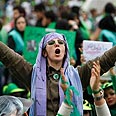
President Ahmadinejad
Photo: AFP

Women protest elections in Iran
Photo: AP
Iranian President Mahmoud Ahmadinejad
on Tuesday sought to put the turmoil over the disputed presidential elections behind him and declared on national television that the contests were clean, fair and were the start of a new era.
His speech came as the country's top three reformist leaders sought to rekindle their opposition movement, demanding that ruling clerics end the heavy "security atmosphere" imposed after the elections and free those detained in the unrest, according to an opposition Web site.
Nuclear Issue
Decade-old cyberwarfare project seen as new vanguard of Israel's efforts to block Tehran's nuclear ambitions; American expert says 'malicious software' could be inserted to corrupt, commandeer or crash the controls of sensitive sites like uranium enrichment plants
It was Ahmadinejad's first national speech since the supreme leader declared the election results valid despite outcry from the other candidates and weeks of street protests that the results were fraudulent.
"This is a new beginning for Iran ... we have entered a new era," the president said, explaining that the 85 percent turnout and overwhelming win had given his government a new legitimacy.
"The election ... was completely clean and healthy. In the re-count, no fault was discovered. The whole nation understood this," he said. "This election has doubled the dignity of the Iranian nation."
During the half hour speech, Iranians in many parts of the city could be heard shouting from their rooftops, "death to the dictator" and "God is great" _ actions that have become a symbol of defiance since the elections.
Meanwhile, opposition leader Mir Hossein Mousavi, who claims to have won the June 12 election, is struggling for a way to channel the widespread discontent which erupted into huge street protests over alleged fraud in the vote but which has since been shattered by the harsh crackdown by police, Revolutionary Guards and Basij militia.
Mousavi hinted on Monday that he may move away from the tactic of protests and create a political party to work in what he called "a legal framework." Late Monday, he met with the top other top stars of the reform movement _ former president Mohammad Khatami and Mahdi Karroubi, another election candidate _ in a show of unity.
The three warned Iran's clerical leadership that if the security crackdown continues, it "will only lead to radicalization of political activities," Mousavi's Web site reported on Tuesday.
But it is not clear how much margin the opposition will have for political action. Many of the top reform figures _ including Khatami's former vice president and one-time members of his Cabinet _ are in detention and could face charges of fomenting riots. Earlier this week, the head of the Revolutionary Guards warned that the elite force would take a major role in defending the country's system of clerical rule.
There was no sign of a let-up in the clampdown imposed since Iran's supreme leader Ayatollah Ali Khamenei declared the official election results valid and Ahmadinejad the victor.
Authorities this week closed universities and dormitories, apparently because of Web site calls for new protests on Thursday, the anniversary of a 1999 attack by Basij and police on protesting students. It is unclear if anyone will attempt a march _ not only because of the security measures but also because of heavy dust clouds and pollution hanging over the capital and other parts of the country the past two days, forcing the closure of government offices.
French President Nicolas Sarkozy, meanwhile, demanded the release of a young French academic detained after taking photos of Iranian protests and accused of espionage.
Clotilde Reiss, 23, was arrested last week at Tehran's airport as she was about to leave Iran after a five-month stay during which she taught French at Isfahan University.
"These accusations of espionage are high fantasy," Sarkozy said at a news conference Tuesday.
Iran's hard-line leaders have been trying to erase any lingering doubts about the legitimacy of Ahmadinejad's government by portraying the unrest as sparked by foreign meddling.
Police say 20 people were killed in postelection violence and more than 1,000 arrested, though they say many have been released.
Despite the clampdown and Khamenei's demand that Ahmadinejad's victory be accepted, a number of top clerics have continued to question the election a rare defiance of the supreme leader from the ranks of the religious establishment.
Banish 'existing security atmosphere'
This week, a party close to one of the most politically powerful clerics former president Akbar Hashemi Rafsanjani issued a statement rejecting Ahmadinejad's victory. It was one of the strongest hints yet on Rafsanjani's stance. He is the head of two major clerical ruling bodies and is a bitter enemy of Ahmadinejad, but has kept his distance from the postelection turmoil."Due to the unhealthy trend of the election, widespread irregularities and the support extended by a majority of Guardian Council members to a specific candidate, the result of this election is not acceptable," the Kargozaran party said in its statement, published on Mousavi's Web site.
Mousavi had been laying low the past week, amid growing calls by hard-liners for his arrest. But on Monday, he emerged to greet well-wishers at his home in Tehran and met with Khatami and Karroubi, a pro-reform cleric who came in last place in the official election results.
In a joint statement, the three demanded an end to the "existing security atmosphere."
"The useless wave of arrests must end immediately and all those detained without committing the least crimes must be released. Also, security and military forces must return to their bases," the three said, denouncing "savage and shocking attacks" by pro-government Basij militia against protesters.
The three also denounced what they called "inhuman, illegal" confessions that state media have said some of the detainees have made. State media have reported that some detainees have confessed to what amounts to collaboration with foreign powers against the Iranian state. The opposition has said the confessions were obtained under duress.















